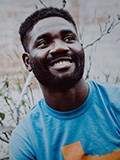by Ayokunle Falomo
Frida Kahlo, 1940, oil on canvas
Always, the body & everything that mirrors it.
My forehead like the sky, my eyebrows—not
unlike the wings of a dead hummingbird—
converge at the bridge of my nose. Blood
trickles down the neck like water down
a rock. My eyes, two rivers that never meet.
My lips’ radish tint. Desire. Lord, the things
I know & wish to unknow. The butterfly’s
attraction to rot, for instance. How difficult
it is to resist metaphor, when I think about
the short-lived existence of the dragonfly.
How exacting it is to unknot the imagined
self from the self that inhabits this body now.
Nobody knows me best but me, it’s true, but
there is much I do not know. Where’s God
in all of this, I ask. Lord, nobody knows
the troubles I’ve seen. My guardian angels
just watch but don’t—or can’t—watch
over me. The story ends, it does, the way
it always does. The body a mirror. Always.
My hair done & wrapped, my body adorned
in white. As though a bride. My neck ornamented
with thorns. Excuse me. I have somewhere to be.
I wrote this in the fall of 2020, waist-deep in the rubble my life had become by then. Or rather, the life I knew as mine. The life I wrongly believed was. During this period, I wrote a series of ekphrastic self-portrait poems—as a way, perhaps, to reconfigure something of a self from what remained.
By now, much is known about Frida’s tumultuous life. By using her self-portrait as a springboard, I wanted to see how deep I could dive into myself—especially the parts where our stories merge. There’s something risky in that though. Something appropriative even. I know that.
When I brought the first draft of the poem to my MFA workshop, I made it a point to say that it’s not necessarily a persona piece although it borrows elements of the persona. Though traces of both of us can be found in the poem, the speaker of the poem is not me, and is not Frida either. Not entirely.
While I’m not opposed to it, I wanted to resist confession for this particular poem. I wanted to tell the story, my story, how I wanted to. To pitch a tent in the desert of “nobody knows / the troubles I’ve seen” and to invite no one in. To say, the details hardly matter. We all suffer. Sooner or later, a shit-ton of bad shit happens to everyone.
It’s possible I have said a lot without saying much more than the poem itself is willing to say. I know that too. So be it. If only for now. Maybe one day I’ll have more to say. Until then, this poem.

Ayokunle Falomo is Nigerian, American, and the author of African, American. A recipient of fellowships from Vermont Studio Center and MacDowell, his work has been anthologized and published in print and online, including The New York Times, Houston Public Media, Michigan Quarterly Review, The Texas Review, New England Review, and Write About Now, among others. Falomo is currently a Zell Postgraduate Fellow at the University of Michigan’s Helen Zell Writers’ Program, where he obtained his MFA in creative writing.